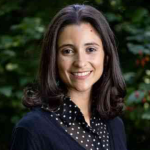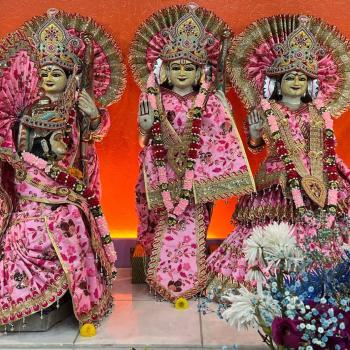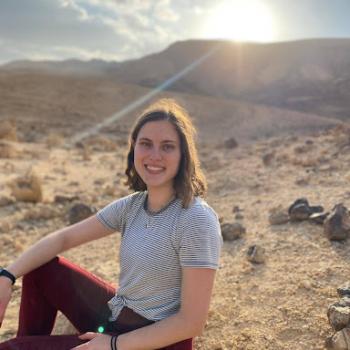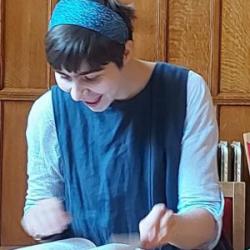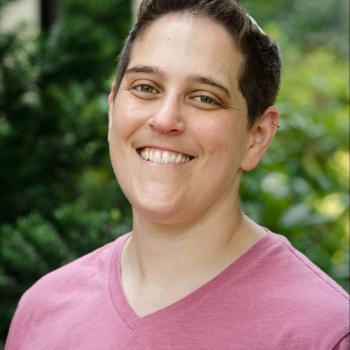Parshat BaMidbar Numbers 1:1-4:20
Parshat BaMidbar ends with detailed instructions of how to properly pack up the Mishkan, our wandering-desert-sanctuary, and its objects. The Kohathites, one of the three Levite clans, are tasked with transporting the Mishkan’s holiest items.
We read:
זֹ֛את עֲבֹדַ֥ת בְּנֵי־קְהָ֖ת בְּאֹ֣הֶל מוֹעֵ֑ד קֹ֖דֶשׁ הַקֳּדָשִֽׁים׃
וּבָ֨א אַהֲרֹ֤ן וּבָנָיו֙ בִּנְסֹ֣עַ הַֽמַּחֲנֶ֔ה וְהוֹרִ֕דוּ אֵ֖ת פָּרֹ֣כֶת הַמָּסָ֑ךְ וְכִ֨סּוּ־בָ֔הּ אֵ֖ת אֲרֹ֥ן הָעֵדֻֽת׃
וְנָתְנ֣וּ עָלָ֗יו כְּסוּי֙ ע֣וֹר תַּ֔חַשׁ וּפָרְשׂ֧וּ בֶֽגֶד־כְּלִ֛יל תְּכֵ֖לֶת מִלְמָ֑עְלָה וְשָׂמ֖וּ בַּדָּֽיו׃
This is the responsibility of the Kohathites in the Tent of Meeting: the most sacred objects.
At the breaking of camp, Aaron and his sons shall go in and take down the screening curtain and cover the Ark of the Pact with it. They shall lay a covering of dolphin skin over it and spread a cloth of pure blue on top; and they shall put its poles in place. (Numbers 4:4-6, JPS Translation).
While the Kohathites are honored with carrying the Ark of the Pact and its Screen, alongside the Table of Display, Showbread, Gold and Copper Altars, Menorah, and all of their instruments, they cannot directly touch these objects, lest they die. The priests, Aaron and his sons, must first wrap them in other materials:
וְכִלָּ֣ה אַֽהֲרֹן־וּ֠בָנָ֠יו לְכַסֹּ֨ת אֶת־הַקֹּ֜דֶשׁ וְאֶת־כל־כְּלֵ֣י הַקֹּ֘דֶשׁ֮ בִּנְסֹ֣עַ הַֽמַּחֲנֶה֒ וְאַחֲרֵי־כֵ֗ן יָבֹ֤אוּ בְנֵי־קְהָת֙ לָשֵׂ֔את וְלֹֽא־יִגְּע֥וּ אֶל־הַקֹּ֖דֶשׁ וָמֵ֑תוּ אֵ֛לֶּה מַשָּׂ֥א בְנֵֽי־קְהָ֖ת בְּאֹ֥הֶל מוֹעֵֽד׃
When Aaron and his sons have finished covering the sacred objects and all the furnishings of the sacred objects at the breaking of camp, only then shall the Kohathites come and lift them, so that they do not come in contact with the sacred objects and die. These objects in the Tent of Meeting shall be the porterage of the Kohathites. (Numbers 4:15).
We no longer have a Mishkan or a Temple in Jerusalem. But often, a separation still remains that actually prevents us from accessing the Divine. So what if we flip this narrative? What if, rather than creating barriers to prevent us from death, we remove barriers to bring us closer to life?
In ḥasidic terms, we can call these barriers the “klipot.” Literally meaning “shells,” they conceal our direct connection to the Divine. The more we can shed our klipot, the closer we connect to God, Torah, and each other.
On a psychological level, the klipot are our insecurities, our hesitations, and all that is holding us back from experiencing the Divine. They are that small voice in our head that says, “No, probably not.” As any free spirit knows, we live our most meaningful lives when we shed away our klipot. That is how we truly connect with the Divine, with the heart of life.
What is this heart of life that we are striving to reach?
Perhaps, it is an awesome experience in nature, precious times with loved ones, or soulful prayer experiences. It is that indescribable feeling that we are part of something cosmic and beautiful – pure delight in the present moment. It is Torah and God all wrapped up in the One.
This heart of life is planted deep within us, but we are often so busy in our day-to-day lives that we forget it is there. It has been present ever since God said, “Let us create humanity in our image, in our likeness” (Genesis 1:26). Each of us is created in the image of the Divine, and we must remember to access this presence.
We are reminded of this holiness deep within us at the conclusion of any aliyah: “Barukh Atah HaShem, Elokeinu Melekh HaOlam, Asher Natan Lanu Torat Emet, V’Ḥayyei Olam Nata B’tokheinu. Barukh Atah HaShem, Noten HaTorah.
Blessed are you God, Ruler of the World, who has given us a true teaching, and planted within us everlasting life. Blessed are You God, the Giver of Torah.”
Only with great vulnerability can we get rid of our klipot, our insecurities that keep us from accessing the heart of life. As Dr. Brené Brown teaches in her book Daring Greatly, “[Vulnerability] is the source of hope, empathy, accountability, and authenticity. If we want greater clarity in our purpose or deeper and more meaningful spiritual lives, vulnerability is the path.”
If we want to live our most meaningful lives full of intimate and awesome experiences with the Divine, and where we feel like we are connecting to something greater than ourselves, we must shed our klipot. We must be vulnerable. As we prepare to receive Torah again this Shavuot, we are reminded that Torah is revealed to us every day; we are constantly presented with the opportunity to connect with the Divine by opening up our hearts.
Finally, our rabbis ask, why is it that the last letter of Torah, lamed, and the first letter of Torah, bet, together spell lev – heart? As the Divrei Emet teaches, “Because God wants the heart – the heart contains all of Torah.”
Wishing you a Shabbat and Shavuot full of blessed vulnerability and experiences of the Divine.
Danny Stein is the rabbi of The Selma and Lawrence Ruben Base UWS in New York City, working alongside his wife Tamara. He is deeply passionate about helping others connect with Judaism in authentically meaningful ways and building a pluralistic Jewish community through Torah, justice and compassion, soulful prayer, and stimulating conversations. You will most likely find him studying a ḥasidic text, (re)watching “The West Wing,” or eating sushi. Danny received his rabbinic ordination from Hebrew College in 2023.


